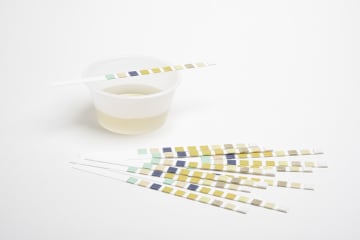
What is a ketone test?
A ketone test checks for ketones in your blood or urine. Ketones are made when the body breaks down fat for energy instead of using sugar from the blood. This can happen if you have diabetes and don't get enough insulin. It can also happen if you have diabetes and are ill.
Why is it done?
This test is done to check your ketone levels. Having large amounts of ketones in your blood can cause diabetic ketoacidosis. This is a serious condition that can lead to death. It needs treatment right away.
How is the test done?
Blood test by a lab
A health professional uses a needle to take a blood sample. It's usually taken from an arm.
Blood test at home
Some home blood sugar meters can also measure blood ketones. You use the same finger-prick method that you use to measure blood sugar. There are also meters that only measure blood ketones.
Urine test
There are different types of at-home urine tests. They use either test strips or tablets to test for ketones. You collect a fresh urine sample in a clean container. Be sure to follow the directions on the bottle of test strips or tablets.
What do the results mean?
The results tell you if ketones are present and the level of ketones that are present. The level is important. High levels can lead to diabetic ketoacidosis. Your doctor will let you know what level is an emergency.
Blood test by a lab
A normal result means there are no ketones in your blood. An abnormal result means there are ketones in your blood.
Blood test at home
If your home blood sugar meter also tests for ketones, it will show your levels on the screen. So will a home blood ketone meter. Ask your doctor what range is high for you.
Urine test
Depending on the type of test, ketones are present if:
- The test strip changes color after you dip it into the urine.
- The urine changes color after placing a test tablet in it.
Most at-home urine tests come with a chart. To find the level of ketones present, compare the color of the test strip or urine to the chart.
What happens after the test?
What happens next depends on the results of your test. If your:
- Ketone levels and blood sugar levels are in the normal range, nothing else needs to happen.
- Ketone levels are normal but your blood sugar is low, follow your doctor's directions for treating low blood sugar. Check your blood sugar levels again in about 15 minutes.
- Ketone levels are normal but your blood sugar is high, follow your doctor's directions for treating high blood sugar. Check your levels again in about 30 minutes. Drink extra liquids to replace the fluids lost through the urine. Water and sugar-free drinks are best.
- Ketone levels and blood sugar levels are high, get medical help right away. You will likely need to go to the emergency room.
Call your doctor if you have any questions.
When should you call for help?
Call 911 anytime you think you may need emergency care. For example, call if:
- You passed out (lost consciousness).
- You are confused or cannot think clearly.
- Your blood sugar is very high and you have a high level of ketones.
- You have symptoms of diabetic ketoacidosis (DKA), such as:
- Increased thirst and urination.
- Nausea.
- Vomiting.
- Belly pain.
Watch closely for changes in your health, and be sure to contact your doctor if:
- Your blood sugar stays outside the level your doctor set for you.
- You have any problems.
Follow-up care is a key part of your treatment and safety. Be sure to make and go to all appointments, and call your doctor if you are having problems. Ask your doctor when you can expect to have your test results.
Where can you learn more?
Go to http://www.healthwise.net/patientEd
Enter B237 in the search box to learn more about "Ketone Testing: About This Test".
Current as of: April 30, 2024
Author: Ignite Healthwise, LLC Staff
Clinical Review Board
All Healthwise education is reviewed by a team that includes physicians, nurses, advanced practitioners, registered dieticians, and other healthcare professionals.

